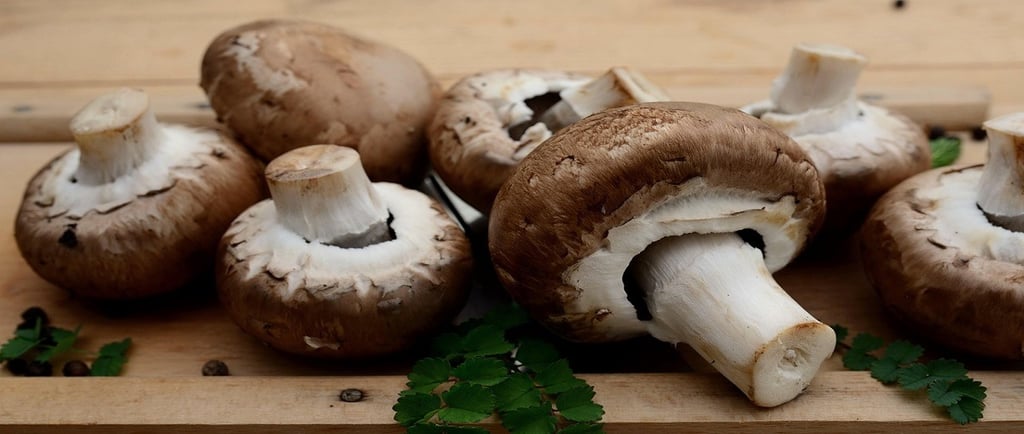Are Mushrooms Healthy?
Mushrooms are a kind of fungus with various health benefits. They are low in calories and contain minerals such as zinc, potassium, and Vitamin B6. Read this mini blog to learn more!


Mushrooms are consumed worldwide for their meaty texture and several nutrients. However, mushrooms are not vegetables or fruits, they are fungi. There are thousands of varieties of mushrooms available, some of which are wild and can be poisonous, and only a few are edible.
Some edible types of mushrooms are cremini, oyster, portobello, shitake, enoki, and button mushrooms. Each mushroom type has its unique appearance.
Mushrooms contain ergosterol, which converts into Vitamin D upon exposure to UV radiation. Vitamin D helps calcium absorption in the bones.
Mushrooms are rich in essential minerals like selenium, zinc, and potassium and contain several B vitamins and antioxidants.
Mushrooms are low in calories: 100 g contains only 22 calories, making them a good food for weight management. Mushrooms can easily be added to soups, pasta, salads, etc.
Many varieties of mushrooms, such as portobello, oyster, and king oyster mushrooms, can be good meat replacements.
Mushrooms have a low glycemic index ( around 15), so it doesn't cause a blood sugar spike.
According to the United States Department of Agriculture (USDA), mushrooms have the following nutrients.
Pros of Eating Mushrooms
1. Antioxidants in mushrooms prevent the cells from harmful free radicals.
2. Minerals like copper, zinc, and selenium in mushrooms help boost immunity.
3. Mushrooms contain ergothioneine, an amino acid that can help lower cancer risk. Shiitake, maitake, and oyster mushrooms are high in ergothioneine.
4. Due to low sodium and high potassium content, mushrooms can help lower blood pressure.
5. The low calorie content of the mushrooms can help in weight loss.
6. Consumption of UV-exposed mushrooms provides a good amount of vitamin D for healthy bones.
7. Mushrooms contain polyphenols, a plant-based compound that can lower the risk of brain diseases like Alzheimer's and Parkinson's.
8. Shiitake mushrooms can improve heart health. It contains eritadenine, a compound that lowers cholesterol levels.
9. Mushrooms improve digestive health. They contain polysaccharides that help promote the growth of good bacteria in the gut.
Cons of Eating Mushrooms
1. Some wild varieties of mushrooms can be poisonous. Only consume mushrooms from the grocery stores, and check the label before buying.
2. Mushrooms are high in fiber; excessive mushroom consumption may cause gas and bloating in people with a weak digestive system.
3. People with a mushroom allergy should avoid consuming mushrooms. Common symptoms of mushroom allergy are skin rash, hives, swelling, coughing, and itching.
4. Mushroom varieties like reishi and cordyceps can interfere with medication. Consult your doctor if you are on medication.
5. Mushrooms grown in a dirty, polluted environment may be contaminated with heavy metals. Buy mushrooms only from reliable sources.
6. Some varieties, like magic mushrooms, contain psilocybin, which can cause hallucinations, changes in mood, and anxiety.
7. Rotten, discolored mushrooms with a bad odour should be avoided as they may cause food poisoning.
1. A type of Armillaria solidipes, also known as honey mushrooms, found in the Blue Mountains in Oregon, is the largest living thing on earth, which covers around 3.5 square miles of area.
2. Around 100 different species of bioluminescent mushrooms glow at night.
3. Cordyceps mushrooms can brainwash the ants and make them zombies.
4. Certain mushroom types generate local wind to disperse their seeds.
5. Mushrooms can grow in Space.
6. Oyster Mushrooms are carnivores; they eat nematodes, a kind of roundworm.
7. Gucchi mushrooms, also known as morel mushrooms, are the world's costliest mushrooms. They are grown in the Himalayan region of India.



